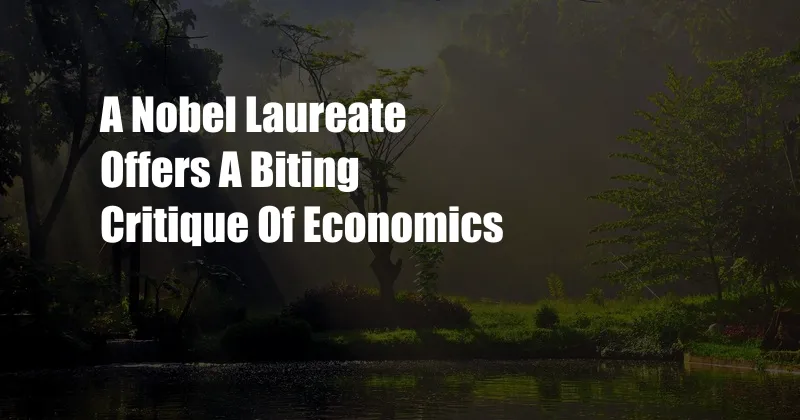
A Nobel Laureate’s Biting Critique of Economics
Economics has long been hailed as the “dismal science” due to its pessimistic view of human nature and the economy’s tendency towards instability. But in recent years, the field has come under fire once more, this time from one of its most distinguished practitioners: Nobel laureate Joseph Stiglitz.
In his book “The Euro: How a Common Currency Threatens the Future of Europe,” Stiglitz argues that the euro has been a disaster for the European Union. He blames the currency’s design, which he says is inherently deflationary, for the eurozone’s prolonged economic stagnation. Stiglitz also criticizes the EU’s austerity policies, which he says have only made the situation worse.
Stiglitz’s Critique of Mainstream Economics
Stiglitz’s critique of the euro is just one part of a broader critique of mainstream economics. He argues that the field has become too narrowly focused on mathematical models and has lost sight of its original mission: to help people. Stiglitz believes that economists need to pay more attention to the real world and to the impact of their policies on ordinary people.
One of Stiglitz’s main criticisms of mainstream economics is that it is overly reliant on rational choice theory. This theory assumes that people are always rational actors who make decisions in their own best interests. Stiglitz argues that this is an unrealistic assumption and that people are often irrational and make decisions that are not in their own best interests.
Implications of Stiglitz’s Critique
Stiglitz’s critique of economics has implications for the way we think about the economy and the policies we make. If Stiglitz is correct, then we need to rethink some of our basic assumptions about how the economy works. We also need to be more careful about the policies we make, and to ensure that they are not based on unrealistic assumptions about human behavior.
Stiglitz’s critique is a timely reminder that economics is not a perfect science. The field is constantly evolving, and our understanding of the economy is always changing. We should not be afraid to challenge our assumptions about the economy and to reconsider our policies in light of new evidence.
How Can We Improve Economics?
Stiglitz offers a number of suggestions for how we can improve economics. He believes that economists need to:
- Pay more attention to the real world and to the impact of their policies on ordinary people.
- Be more realistic about human behavior.
- Develop better models that take into account the complexity of the real world.
- Be more open to alternative theories and approaches.
Stiglitz’s critique is a valuable contribution to the debate about the future of economics. He raises important questions about the field’s assumptions, methods, and policies. We should take his critique seriously and work together to improve economics so that it can better serve society.
General FAQ
What is economics?
Economics is the study of how people make decisions in the face of scarcity. It is a social science that seeks to understand how individuals, businesses, and governments allocate resources.
What are the main branches of economics?
The main branches of economics are microeconomics and macroeconomics. Microeconomics is the study of the behavior of individual entities, such as households, firms, and individuals. Macroeconomics is the study of the economy as a whole, including topics such as inflation, unemployment, and economic growth.
What are the major schools of economic thought?
The major schools of economic thought include classical economics, Keynesian economics, and monetarism. Classical economics emphasizes the role of the free market and laissez-faire. Keynesian economics emphasizes the role of government intervention in the economy. Monetarism emphasizes the role of the money supply in the economy.
What are the major challenges facing economics today?
The major challenges facing economics today include:
- The global financial crisis
- The rise of inequality
- Climate change
Conclusion
Economics is a complex and ever-changing field of study. Nobel laureate Joseph Stiglitz has offered a biting critique of mainstream economics, arguing that it has become too narrowly focused on mathematical models and has lost sight of its original mission: to help people. Stiglitz believes that economists need to pay more attention to the real world and to the impact of their policies on ordinary people.
Stiglitz’s critique is a timely reminder that economics is not a perfect science. The field is constantly evolving, and our understanding of the economy is always changing. We should not be afraid to challenge our assumptions about the economy and to reconsider our policies in light of new evidence.
Are you interested in learning more about economics? If so, there are a number of resources available to you. You can read books and articles on economics, take courses at a local college or university, or attend conferences and workshops. You can also find a wealth of information online, including websites, blogs, and discussion forums.